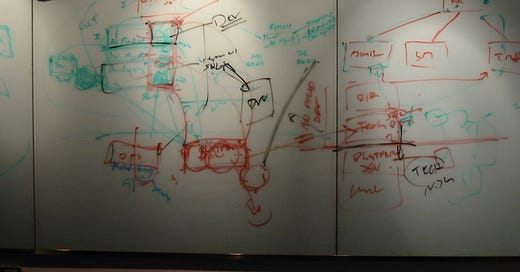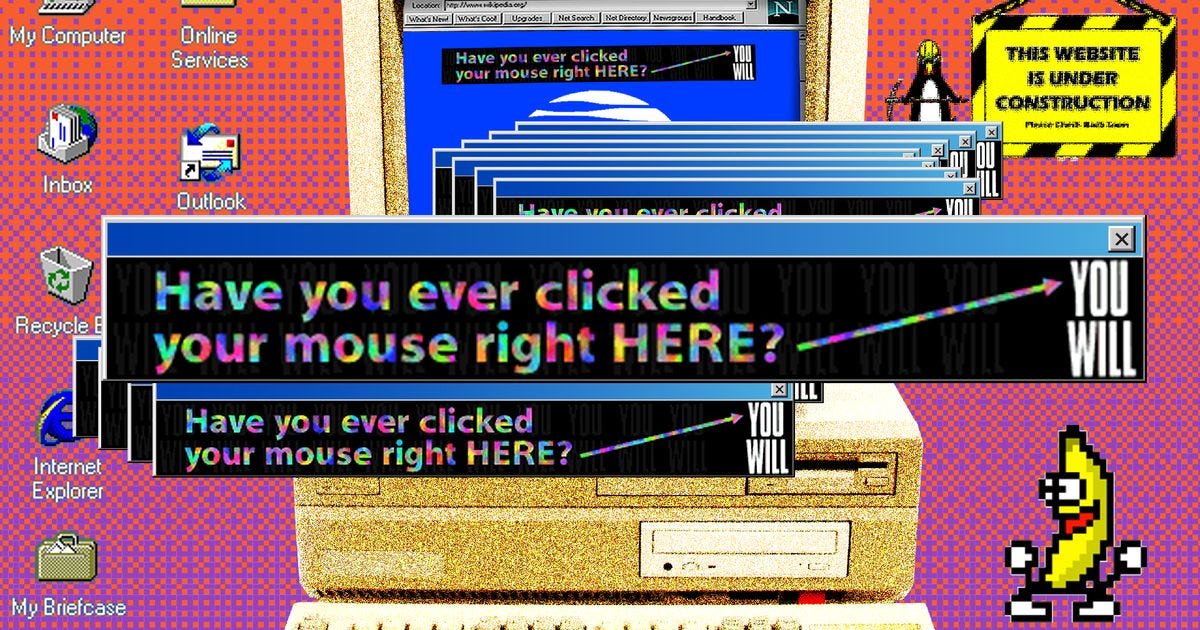This was originally written in 2018 on my personal site; now reposted here.
I started a conference in 1999 called AdMonsters, during the last couple of years that I worked at HotWired/Wired Digital (the “digital” side of WIRED Magazine), where I was building big-at-the-time web back ends like the Hotbot search engine, along with systems to serve ads on top of those sites. Basically, I went looking for professional peers to talk to about the work I was doing, didn’t find a community that I liked, and so I created it. This is how many many many businesses get started, and the basic, often unconscious move than many self-starter entrepreneurs make—solve your own problem.
There is a much longer version of this backstory, but, because “information wants to be be free,” and because online payments didn’t exist then, early online publishers rejected the idea that anyone would pay for content online, and so all early efforts went to generating revenue via online advertising (vs subscriptions).
Unlike magazines, newspapers, and other media, digital publishers became wholly reliant on advertising. Digital publishers developed and suffered from a collective delusion that advertising was a simple and harmless way to make a business out of creating online media. Read Jaron Lanier’s books and Ev Williams on The Rationalization of Publishing for more of that history.
From my intimate vantage point as the host of a years-long conversation amongst many of the leading online publishers and the tech companies that emerged to serve their demand for systems to serve and manage ads, it became increasingly clear that online advertising was neither simple, nor harmless.
In many cases online advertising was so inefficient, complex and also so easily arbitraged, undercut, and/or middle-manned as to not actually be viable as a business model for the publisher. It often cost more to serve and manage all the ads than the revenue they brought in, and the complexity of multi-layered ad serving and management systems was often overwhelming—at least to me.
Along with that, the moral hazard of online advertising began to snowball exponentially due to the interconnectedness of online systems and the ease with which data about users can be gathered, transferred, exchanged, bought, sold, lost, hidden, and otherwise manipulated.
Starting in the early to mid-2010’s, I began to tell participants at my own conferences (again, called AdMonsters, about online advertising) that the whole online ad thing was just getting too messy and too nasty, and in my opinion they should very seriously consider moving away from advertising as their sole source of income and put some effort into subscriptions and other revenue streams.
The primary response at the time was try to leverage all of their experience running ads to add “native” advertising (infomercials) and “content marketing” (infomercials) to the mix. Early efforts to make subscriptions work with paywalls didn’t really take off until the iPhone/app store revolution got people used to paying for content again. It took some time, but many online publishers now generate a substantial proportion of their revenue from subscriptions and other forms of direct sales (although most haven't at all given up on advertising).
In the meantime, the world of online advertising continued to grow additional layers of indirection and arbitrage, vast pools of sortof-anonymized data about “users”—that is, people—and ever-more-massive garbage fires due to hacking, data leaks, complexity, profit-seeking haste, and sloppiness.
Advertising came to be such a large part of online business models because of early assumptions that content should somehow be free, that people won't pay for content, and that it would be too hard to accept payments anyhow. We’ve long since learned that all three of these assumptions are false.
I’ve said this now for some time and I’ll say it again here: nobody would shed a tear if we just turned advertising off, and it wouldn't harm the economy one bit. I include advertising in a long list of things like oil, plastics, meat, double-decker waterfront freeways, and hazelnut-flavored coffee that peaked in the 20th-century and whose time came…and went.
As all of this became increasingly clear to me, I began to work towards getting out of the world of advertising, and I managed to sell my conference business in 2015. I’m posting this again here not to claim credit or count coup—and I’m happy to see AdMonsters continue to thrive in serving a professional community that I’m proud to have a hand in originating—but to keep the conversation alive about media business models, the long and tangled history of online advertising.
Thanks for reading, and for being part of this journey.
I wrote the original version of this in 2015, just after I sold my business. Now it’s here as part of my writing. I’ve written more about this period of my life, and the subject of advertising, in this chapter of my memoir ⬇️
Early days in the advertising-industrial complex, why nobody wants to pay for writing online, and why most conferences are so terrible.
When I look back at those last years of the nineties, it feels like a blur, and a binge. I was working the back half of what had unexpectedly become a first career in what had already started to be called “tech,” and it was starting to be clear to me that I wanted out. It was also true that I was still just in my twenties, and I wasn’t clear on much else, and I figured that I’d make the most of the ride while I could, especially since it was pretty clear that nobody was looking very closely at what I was doing. I liked feeling that I was getting away with something, and I took advantage of the ability to do so whenever I could, medium-wave surfing my corporate expense account with an constant excess of business travel, restaurant dining, drunken sex, and hotel high life, all of which felt like something while remaining entirely unfulfilling.
What do you think?
How do you feel about advertising? What if we just turned it all off?
What’s the best conference you’ve ever been to? The worst?
Were you around in the early days of “tech” and digital media? I’d love to hear your story!
Was this worth reading?
Use the heart to let me know
👇🏻






Reminds me of a Bill Hicks line... if you’re into marketing kill your self right now! So hard to be pure in this world